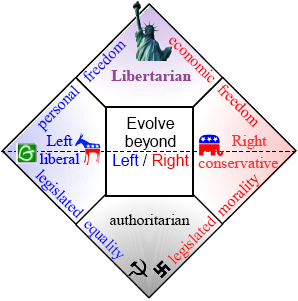| Question | Result | Prediction | Comment |
| 1. Market to voters, not guide our candidates | 72% | 60% | rebukes radicals |
| 2. Educate the public, not appeal to our sympathizers | 70% | might get more, but close | rebukes short A/B |
| 3. Short platform on fewer issues, not longer on more | 71% | probably get more | rebukes 2004 |
| 4. Emphasize benefits over complaints | 87% | will win handily | duh |
| 5. Emphasize benefits over moral justifications | 68% | should edge | rebukes radicals |
| 6. Clean slate, not amend existing language | 59% | should get a majority | rebukes 2004 |
| 7. Silence on schisms, or compromise langauge | 51% | will probably win | inconsequential |
| 8. Little to no implementation detail, not comprehensive detail | 77% | will win convincingly | supports Pure Principles |
| 9. Emphasize topics appealing to voters, not internal constituencies | 83% | will win due to phrasing | inconsequential |
| 10. Emphasize direction (next few years) over destination | 62% | eke out a majority | rebukes radicals |
| 11. State our positions even if most voters disagree | 76% | will be close | rebukes short A/B |
The two questions where my predictions were least accurate (2 and 11) showed that I had somewhat over-estimated the potential appeal of a top-N-issues Short A/B style of platform. The survey generally confirms that likely delegates want a platform that neither hides our principles nor buries them under implementation details.
In Alicia's survey, questions 3, 6, 8, and maybe 10 can be taken as a referendum on the 2004 "Atlanta" format. The vote against the Atlanta style by respondents who are likely delegates was (respectively) 71%, 59%, 77%, and 62%. I predicted that #8 would win "convincingly" while the other three would get majorities, but I was still surprised at how lop-sided these results were. To me the crucial question was 8, in which 77% of likely delegates chose "little to no implementation detail" over "comprehensive details". The only criticism of the Pure Principles draft from serious radicals like David Nolan, Henry Haller, and Starchild (who all otherwise praise it) is that it's short on implementation detail. Alicia's survey shows that this criticism is not a deal-breaker, and in fact helps the draft's chances.
The survey was obviously not designed to support the reformers' Pure Principles draft, and only question 8 can be considered a referendum on the Pure Principles approach. Questions 3/6/10 were aimed squarely at the Atlanta format, which failed miserably on each of them. Questions 4 and 9 were inconsequential softball questions, as almost nobody was going to favor a negative Platform or a focus on internal constiuencies. The even split on question 7 (silence vs. compromise language) is meaningless because it doesn't reveal how few people support the Platform taking a stand against the LP's minority views. Question 1 fairly rebuffed the radicals' idea that the Platform should not be about internal candidate guidance, but if question 11 was rigged then it backfired, showing that we should embrace libertarian positions even if mainstream voters don't. Question 2 could be seen as similarly backfiring, since it rejects the idea (inherent in the old LRC Short A/B platforms) that we should cherry-pick areas of agreement with mainstream voters. Question 5 was a fair referendum on moralistic vs. utilitarian outreach, and the radicals' position lost convincingly 68 to 32.
In the end, the survey did a fair job of discrediting
- the Atlanta style of detailed Platform,
- the radical ideas of internal education and emphasizing morality over utility, and
- the reformer idea of cherry-picking issues with mainstream support.

